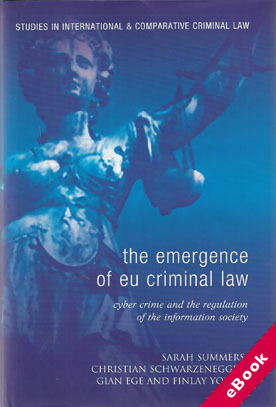
The device(s) you use to access the eBook content must be authorized with an Adobe ID before you download the product otherwise it will fail to register correctly.
For further information see https://www.wildy.com/ebook-formats
Once the order is confirmed an automated e-mail will be sent to you to allow you to download the eBook.
All eBooks are supplied firm sale and cannot be returned. If you believe there is a fault with your eBook then contact us on ebooks@wildy.com and we will help in resolving the issue. This does not affect your statutory rights.
Criminal law can no longer be neatly categorised as the product and responsibility of domestic law. That this is true is emphasised by the ever-increasing amount of legislation stemming from the European Union (EU) which impacts, both directly and indirectly, on the criminal law.
The involvement of the EU institutions in the substantive criminal laws of its Member States is of considerable legal and political significance. This book deals with the emerging EU framework for creating, harmonising and ensuring the application of EU criminal law.
This book aims to highlight some of the consequences of EU involvement in the criminal law by examining the provisions which have been adopted in the field of information and communications technology. It provides, in part one, an overview of the criminal law competence of the EU (in the context of the first and third pillars and under the proposed ‘Reform Treaty’) and evaluates the impact of these developments on the criminal laws of the Member States.
In the second part, EU legislation which requires Member States to regulate matters such as data protection, e-security, intellectual property and various types of illegal content through the criminal law is analysed. In the course of this evaluation, particular consideration is given to issues such as, the basis on which the EU institutions establish the need for criminal sanctions, the liability of service providers and the extent to which the Member States have adhered to, or departed from, the legislation in the course of implementation.